Learning Spanish sounds can be tough, especially with sounds that aren’t in your own language. For example, the harsh ‘j’ sound in ‘reloj’ or the rolling ‘rr’ in ‘perro’ can be tricky. Getting these sounds right is crucial if you want to speak Spanish well. Plus, even slight changes in vowel sounds can completely change the meaning of a word. It’s not just about getting it right; it’s essential.
But there’s more to it than just pronunciation. These tough words also carry cultural meanings that can affect how you communicate. Let’s dig into that and see how it plays out in real conversations.
Difficult Spanish Pronunciation For Spanish Learners
Learning how to pronounce Spanish can really help you speak and understand the language better. There are some tricky sounds like the ‘J’ and ‘G’, the rolling ‘RR’, the sharp ‘TR’, and the slight differences in vowel sounds. Getting these right is key to speaking Spanish well.
Let’s break it down a bit. You know how in English, some sounds can be tough for non-natives? It’s similar in Spanish. Take the ‘J’ and ‘G’—they can sound harsh, almost like you’re clearing your throat. And then there’s the double ‘RR’. It’s like a longer roll of the tongue, something many struggle with at first. The ‘TR’ is another one; it’s not just a ‘T’ and an ‘R’, but a crisper, stronger sound.
And don’t forget the vowels. Each one has its own subtle sound, and mixing them up can change the meaning of a word. So, it really pays to practice these sounds. It makes a big difference in how well you can speak and understand Spanish.
That J sound
Learning how to say the Spanish ‘j’ sound can be tough. It’s a bit like the harsh ‘h’ sound in the word ‘huge’ in English.
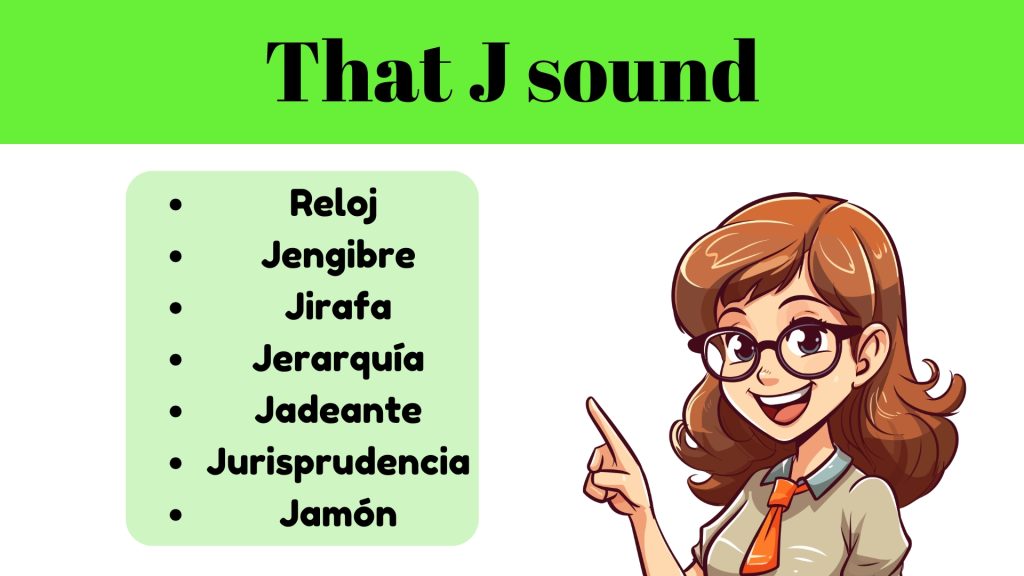
You have to push air from deep in your throat. Getting this right can really help you sound more natural and understand native speakers better.
| Word | Meaning |
|---|---|
| reloj | watch |
| jengibre | ginger |
| jirafa | giraffe |
| jerarquía | hierarchy |
| jadeante | panting |
| jurisprudencia | law system |
| jamón | ham |
| jinete | horse rider |
| juventud | youth |
| jaqueca | headache |
| jubilado | retired |
| jolgorio | party |
| jeringa | syringe |
| justiciero | avenger |
| jactarse | to brag |
That G sound
We’ve looked at the ‘j’ sound, so now let’s tackle the Spanish ‘g.’ It can be tricky.
The ‘g’ sound changes depending on the letter that follows it. Before ‘a,’ ‘o,’ or ‘u,’ it sounds like the ‘g’ in ‘go’—pretty straightforward, right? But before ‘e’ or ‘i,’ it’s softer, more like the ‘h’ in ‘hero.’
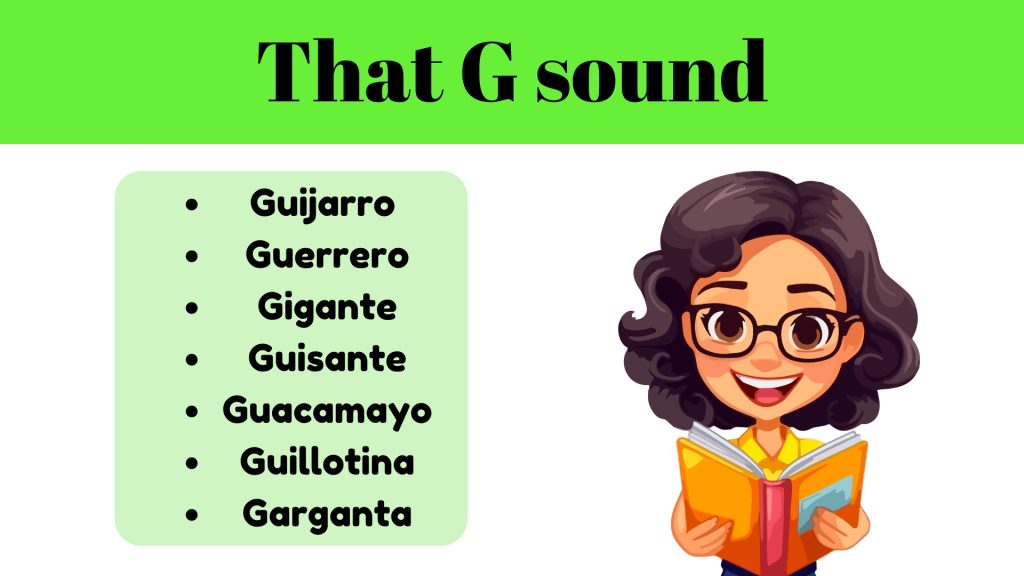
Try saying ‘gato’ and then ‘girar.’ Hear the difference? Keep practicing these to get the hang of it.
| Word | Meaning |
|---|---|
| guijarro | pebble |
| guerrero | warrior |
| gigante | giant |
| guisante | pea |
| guacamayo | macaw |
| guillotina | guillotine |
| guaraní | indigenous tribe |
| garganta | throat |
| genealogía | genealogy |
| gigantesco | gigantic |
| garantizar | to guarantee |
| guanábana | soursop fruit |
| golosina | candy |
| guanaco | type of llama |
| geografía | geography |
That double RR sound
The Spanish ‘rr’ sound, or ‘erre doble,’ is tough for many learners. You need to place your tongue just right and control your breathing.
Your tongue has to quickly tap the roof of your mouth. This makes a rolling sound, different from the single ‘r’. It’s important because it changes the meaning of words.
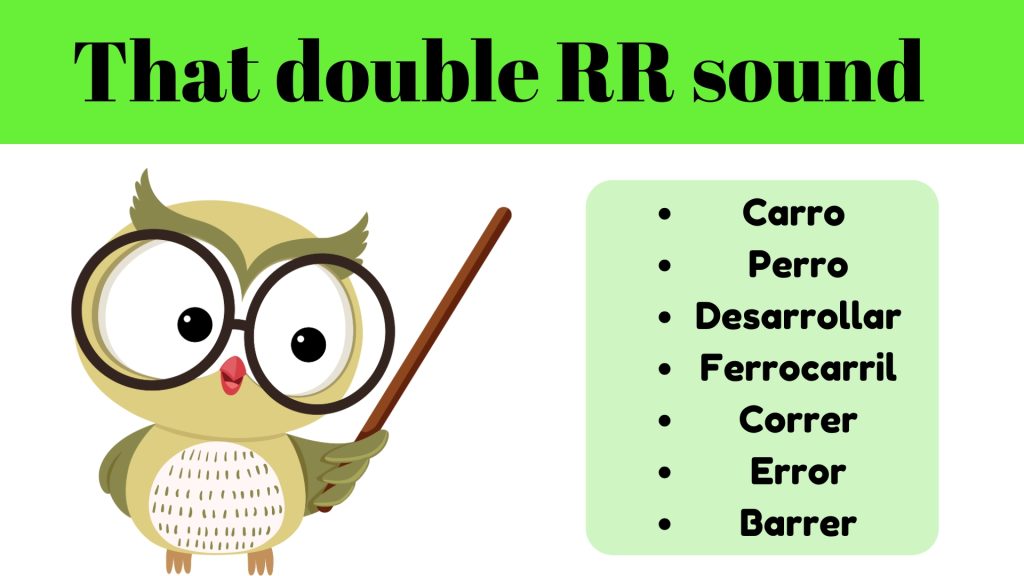
For example, ‘perro’ means dog, and ‘pero’ means but.
| Word | Meaning |
|---|---|
| carro | car |
| perro | dog |
| desarrollar | to develop |
| ferrocarril | railroad |
| correr | to run |
| error | mistake |
| barrer | to sweep |
| arrojar | to throw |
| borrar | to erase |
| encerrar | to lock up |
| herrero | blacksmith |
| terremoto | earthquake |
| arrastrar | to drag |
| horror | horror |
| zorrillo | skunk |
Start your Spanish word hunt with this jam-packed J list.
That TR sound
The ‘TR’ sound can be tough for Spanish learners. It shows up in words like ‘trabajo’ (work) and ‘árbol’ (tree).
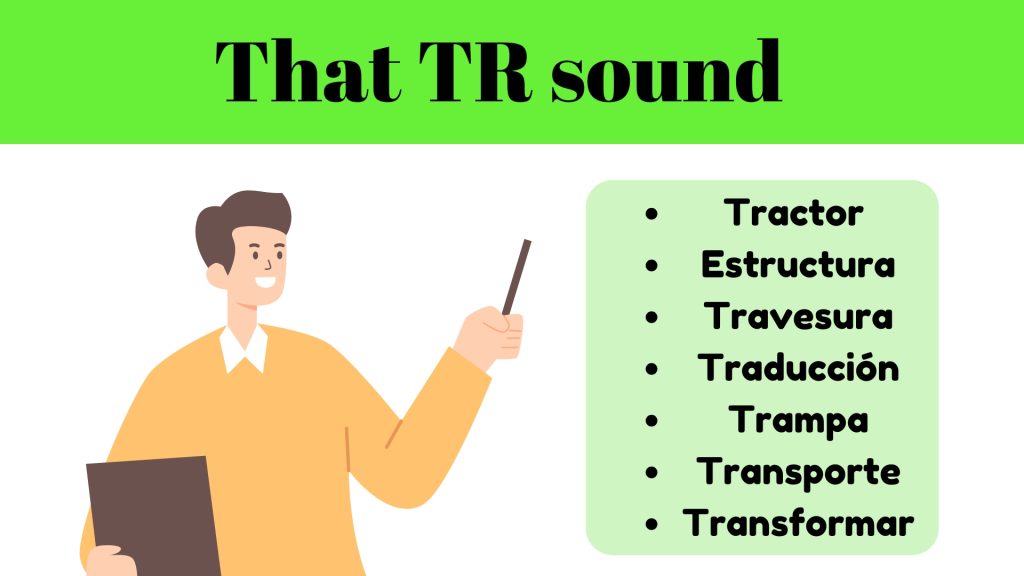
You need to switch quickly from a sharp ‘t’ to a rolled ‘r.’ Getting this right really helps you speak Spanish more clearly and naturally.
| Word | Meaning |
|---|---|
| tractor | tractor |
| estructura | structure |
| travesura | mischief |
| traducción | translation |
| trampa | trap |
| transporte | transport |
| transformar | to transform |
| triturar | to crush |
| traicionar | to betray |
| transmitir | to transmit |
| trayectoria | path |
| tratar | to try/treat |
| tremendo | tremendous |
| triple | triple |
| trámite | procedure |
All those vowels
Learning all the vowel sounds in Spanish is tough, especially when they’re back-to-back. It can really throw off your pronunciation.
For example, saying ‘aeropuerto’ right matters a lot. It helps you get good at knowing when to blend vowels and when to keep them apart.
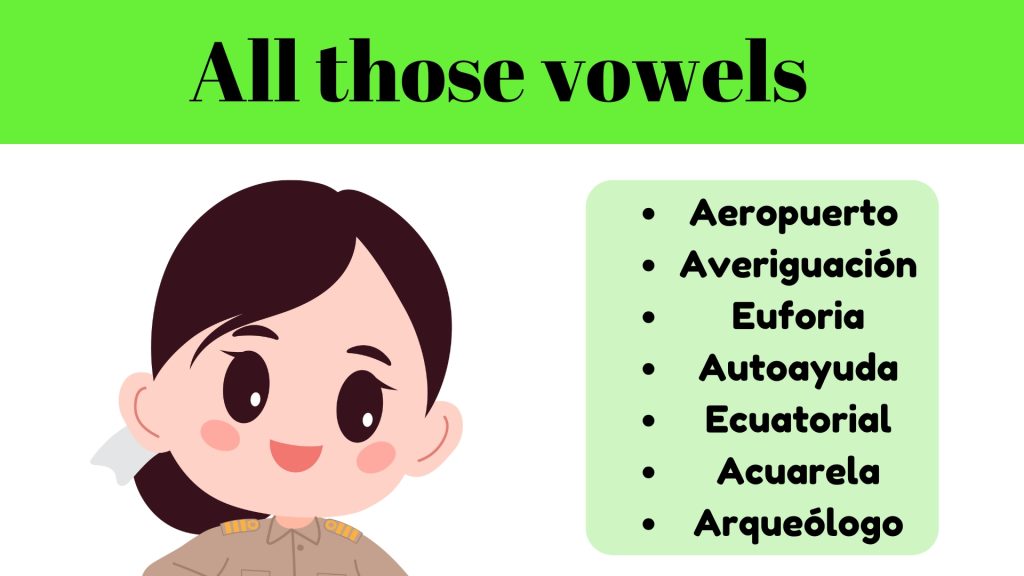
This is key if you want to speak clearly and be understood.
| Word | Meaning |
|---|---|
| aeropuerto | airport |
| averiguación | inquiry |
| euforia | euphoria |
| autoayuda | self-help |
| ecuatorial | equatorial |
| acuarela | watercolor |
| oasis | oasis |
| abuelo | grandfather |
| arqueólogo | archaeologist |
| avestruz | ostrich |
| anuario | yearbook |
| autoestima | self-esteem |
| enagua | petticoat |
| euforia | euphoria |
| oleaginoso | oily |
Hard Spanish Words to Say Correctly
Some Spanish words are really tough to pronounce, even if you’ve been learning for a while.
Take ‘ferrocarril’ — rolling that ‘rr’ isn’t easy.
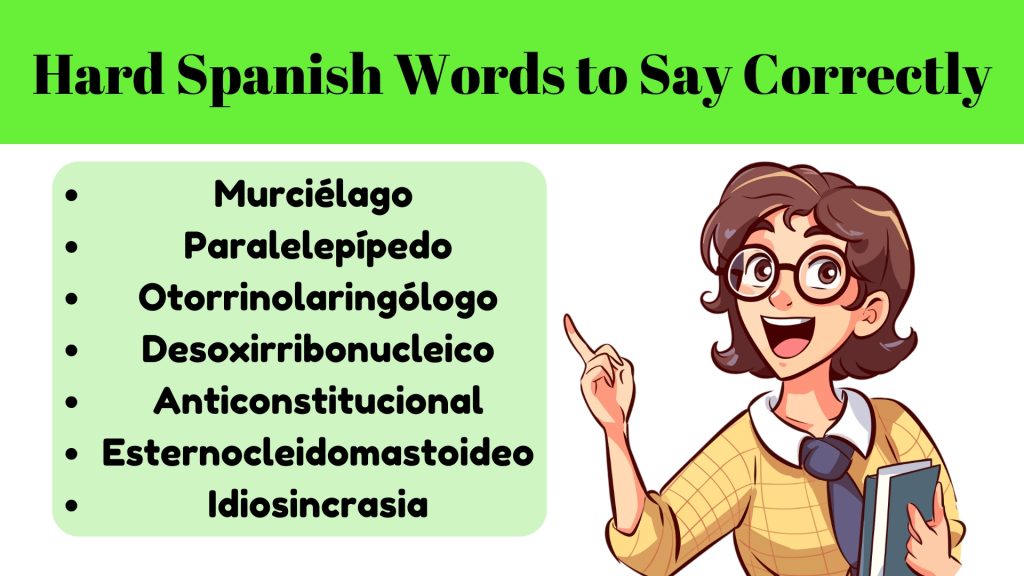
Then there’s ‘espantapájaros,’ where you have to juggle sharp consonants and clear vowel sounds.
And don’t get me started on ‘agujero’ — mixing those ‘g’ and ‘j’ sounds? It takes a lot of practice to get it right.
| Word | Meaning |
|---|---|
| murciélago | bat |
| paralelepípedo | parallelepiped |
| otorrinolaringólogo | ENT specialist |
| desoxirribonucleico | DNA-related |
| anticonstitucional | unconstitutional |
| esternocleidomastoideo | neck muscle |
| idiosincrasia | trait/quirk |
| aborrecimiento | loathing |
| empedernido | hard-headed |
| inconstitucional | unconstitutional |
| inverosímil | unlikely |
| meteorología | meteorology |
| electrodoméstico | appliance |
| circunferencia | circumference |
| acostumbrarse | to get used to |
Hardest Spanish tongue-twisters
Spanish tongue-twisters, or ‘trabalenguas,’ are really tough! They’re all about tricky sounds that repeat and can tie your tongue in knots.
These phrases aren’t just for fun; they seriously boost your pronunciation skills. If you get good at them, you’ll see a big improvement in how you speak Spanish.
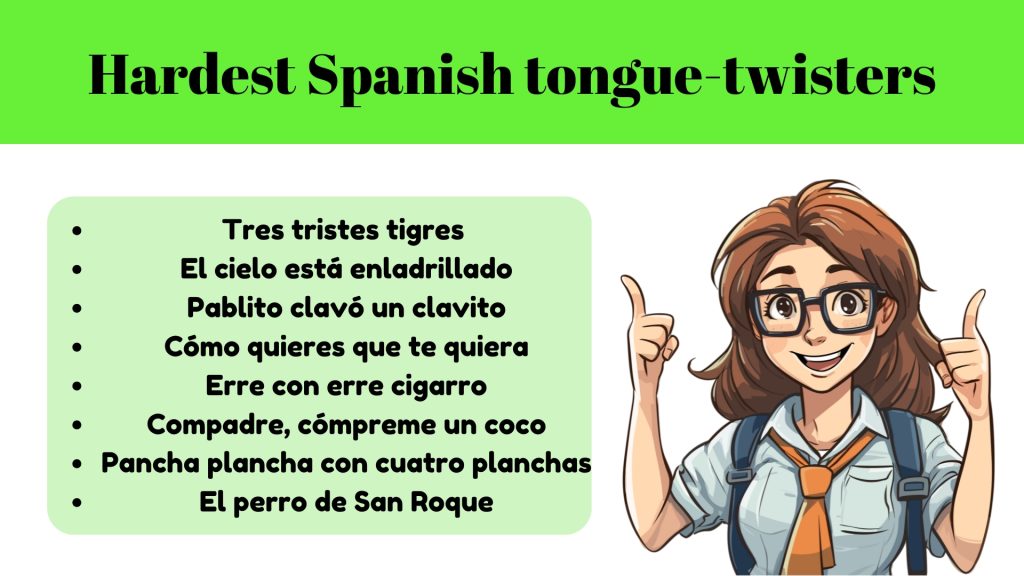
They’re super useful for anyone trying to get better at the language.
| Tongue-twister | Meaning (English) |
|---|---|
| tres tristes tigres | three sad tigers |
| el cielo está enladrillado | the sky is bricked |
| Pablito clavó un clavito | Paul nailed a little nail |
| cómo quieres que te quiera | how do you want me to love you |
| erre con erre cigarro | R rolled like cigar |
| compadre, cómpreme un coco | friend, buy me a coconut |
| pancha plancha con cuatro planchas | Pancha irons with four irons |
| el perro de San Roque | San Roque’s dog |
| si Sansón no sazona su salsa | if Samson doesn’t season his sauce |
| el que poco coco come | the one who eats little coconut |
| el rey de Constantinopla | king of Constantinople |
| cómo come el camarón | how the shrimp eats |
| bajo el puente de la paja | under the straw bridge |
| qué triste está Tristán | how sad Tristan is |
| parra tenía una perra | Parra had a dog |
Discover the quickest way to say “Excuse Me” in Spanish.
Longest Spanish words
The word ‘electroencefalografista’ is a mouthful, right? It’s one of the longest Spanish words and it means someone who specializes in electroencephalography.
It just goes to show how complex Spanish can get, especially with medical and scientific terms. Even people who speak Spanish well might find this word tricky.
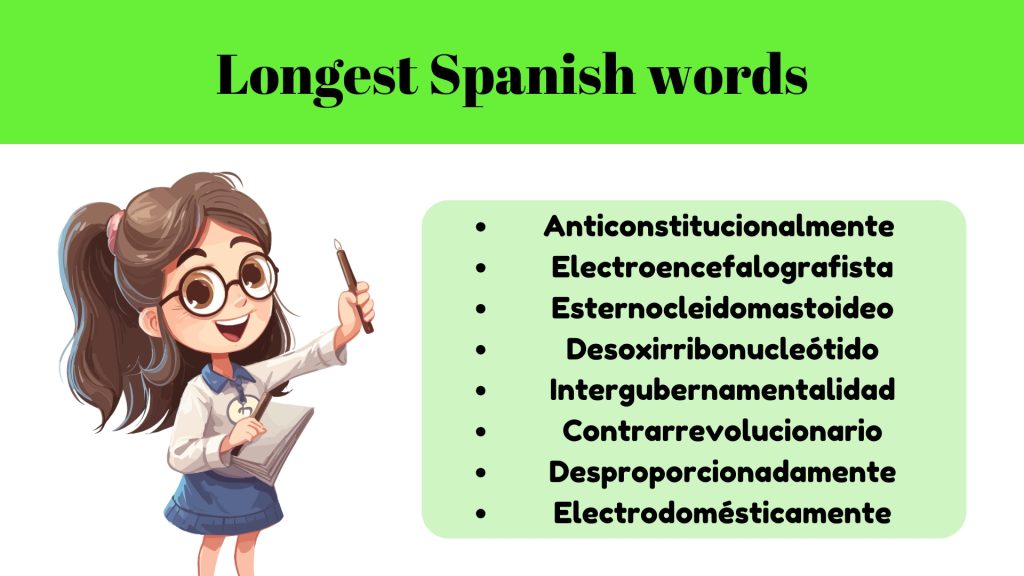
It’s a good example of how the language can create very specific, descriptive words.
| Word | Meaning |
|---|---|
| anticonstitucionalmente | unconstitutionally |
| electroencefalografista | EEG technician |
| esternocleidomastoideo | neck muscle |
| desoxirribonucleótido | DNA component |
| intergubernamentalidad | between governments |
| contrarrevolucionario | counter-revolutionary |
| desproporcionadamente | disproportionately |
| electrodomésticamente | appliance-wise |
| hipertextualización | hyperlinking |
| politicamentecorrecto | politically correct |
| psicofarmacológico | drug therapy related |
| radioinmunoanálisis | radioimmune analysis |
| sobrealimentación | overfeeding |
| ultramicroscopicoscopía | tiny microscope study |
| videograbadordigital | digital video recorder |
Conclusion
To get better at speaking Spanish, you really need to practice a lot. Focus on the tricky sounds like ‘J’, ‘G’, the rolling ‘RR’, and the sharp ‘TR’. Getting these right helps you speak more clearly.
Also, practicing with difficult words and tongue-twisters can make you more fluent. This isn’t just about speaking well; it also helps you understand the culture behind the language better.
Learn from the best—Lingua Viva expert guidance is just a click away.
Dayron is co-owner, and the heart of Lingua Viva. He is a licensed Educator and Interpreter with 15+ years of experience, and holds a graduate degree in Foreign Language Instruction. A native Caleño who creates a comfortable environment for his students. Dayron is loved by all and inspires confidence in his students when learning and speaking Spanish. He is also an avid comedian that loves to dance salsa.











